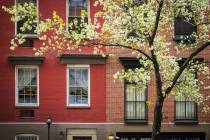Rules OK’d to cap collection-agency fees in HOA cases
After hearing passionate arguments pro and con, a home- owner regulatory commission Wednesday approved an initial draft of regulations that limit fees that collection agencies charge for pursuing past-due homeowner association bills.
The seven-member Nevada Commission for Common-Interest Communities voted to set a $1,950 limit on the fees that collection agencies, which are hired by homeowner associations, can levy against homeowners for late payments.
Under current rules, collection agencies "can charge whatever they want," former Sen. Richard Bryan explained after the hearing.
During the morning session, real estate broker Tracey Donley lambasted a collection agency that demanded $9,440 for a condominium property with $2,700 in homeowner association fees that had accrued over 13 months. The value of the condo was $29,000, she said.
"There has to be regulation," she said. "You're here to protect the public. You are not here to protect the collection agencies."
Some speakers said that homes may be subject to dues from multiple associations and that may increase costs.
Jack Behrens, who said he serves on two homeowner association boards, sided with collection agencies.
"If I was collecting this, I would not be as kind," Behrens said.
He said that some homebuyers are investors.
"Investors come in and see these huge fees (for unpaid homeowner association fees)," he said. "Guess what? That's a cost of doing business."
About 100 people attended the session at the Sawyer Building. Dozens of homeowner association representatives, collection agency executives, real estate investors and real estate agents spoke on the issue.
Bryan urged the commission to cap the fees that collection agencies could charge.
Executives from collection agency Red Rock Financial Services later recommended the commission set the collection fee maximum at $1,950.
Commissioner Randolph Watkins suggested setting the maximum at $2,500, because he wanted to allow for inflation of fees over the next few years and did not want to go through another round of meetings to change the cap again. However, the commission decided to stick with $1,950.
The late fee cap doesn't include the dues, late fees, interest and other charges imposed by the homeowner association. Nor does it include charges for costs incurred by collection agencies.
The proposed new regulation, however, lists maximum specific fees that can be charged for specific services, such as $150 for demand letters and $400 for notices of default.
The fees are charged to both homeowners who are late in paying homeowner association assessments and buyers, including investors, who purchase the home after recent foreclosures.
Before the hearing, several commissioners mentioned their affiliation with parties that have an interest in the regulations, but a deputy attorney general assured them that they had no conflicts of interest.
Real estate agent Troy Kearns wasn't convinced and suggested the board hire an independent third party to draft regulations on collection agency fees. Buckley said the state didn't have money to hire someone else to prepare regulations.
Contact reporter John G. Edwards at jedwards@reviewjournal.com or 702-383-0420.

















